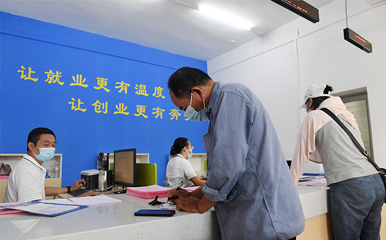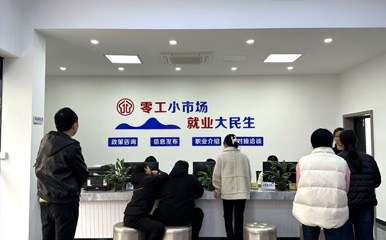Inner Mongolia Autonomous Region Department of Human Resources and Social Security
Implementation plan for strengthening the construction of offline gig market
In order to fully implement the deployment requirements of the country and autonomous regions, fully promote the implementation of work, support flexible employment through multiple channels, and promote the employment of elderly and difficult flexible employment personnel, this plan is specially formulated. All regions are requested to conscientiously implement it.
1、 Overall requirements
To implement, effectively strengthen organizational leadership, vigorously promote the construction of the gig market, provide more practical, targeted, and comprehensive convenient public employment services for migrant workers, scattered workers, and employers nearby, safeguard the legitimate rights and interests of both parties, and make every effort to stabilize the employment situation.
2、 Main objectives
We will vigorously promote the construction of the gig market in accordance with the requirements of scientific layout, standardized construction, efficient operation, and high-quality services. By October 2023, each county (city, district) shall establish at least one gig labor market with complete infrastructure, adequate service guarantees, and standardized operation, and gradually improve its functions and expand its extended services based on local conditions. It shall gradually build a gig labor market that integrates functions such as waiting for employment, job information release, skill training, labor rights protection, and legal consultation, providing a service platform for flexible employment personnel and employers.
3、 Construction principles
1. Adhere to the principles of scientific planning and convenience for the people. Starting from the convenience of finding jobs for gig workers and employing them, scientific planning and layout, reasonable site selection and setting, standardized empowerment and efficiency improvement, optimized service processes, and created a good environment to provide standardized, efficient and fast services for gig workers and employers.
2. Adhere to the principle of combining integration and renovation with new construction. The gig market can be constructed through existing resource integration, renovation, or new construction. For job seeking locations where gig workers spontaneously gather, it is also possible to set up gig service venues nearby by renovating and utilizing idle buildings, building necessary service facilities, and other means.
3. Adhere to the principles of public welfare and safeguarding rights and interests. We mainly provide free supply and demand docking platforms for gig workers and employers. It is strictly prohibited to raise the threshold for migrant work and increase the burden of gig work under the pretext of strengthening management. Standardize the template of gig employment agreements, guide the signing of labor relationship agreements, and safeguard the legitimate rights and interests of workers.
4. Adhere to the principles of territorial management and long-term standardization. In accordance with the requirements of planning and construction standards, compliance of service subjects, professionalism of work teams, and long-term operation management, human resources and social security departments at all levels should take the lead in coordinating the construction and management of the gig market by relevant departments, and do a good job in site planning, project approval, construction management, information services, etc. to ensure standardized construction and long-term operation.
4、 Main job tasks
1) Strengthen the infrastructure construction of the gig market
1. Scientific and reasonable layout and construction. Based on the development plan of urban and rural construction, we will coordinate and optimize the existing resources of public employment services, choose locations with convenient transportation and concentrated job seeking, and build a gig market through integration, renovation, and construction. The obvious location of the market will be uniformly marked as "XX Banner County (City, District) gig market", providing free venues for gig workers to negotiate face-to-face with employers and occupational intermediaries. For job seeking locations where gig workers spontaneously gather and have a certain scale, if conditions permit, they can set up gig service venues nearby by renovating and utilizing idle buildings, building necessary service facilities, etc., guiding both job seekers and recruiters to carry out orderly docking and negotiations, and achieving a "retreat" from the gig market to the hospital. Regions with conditions can extend the construction of gig markets to streets (Sumu Township) and communities (Gacha Village) with demand, creating a flexible employment service platform that covers the entire area.
2. Improve supporting convenient facilities. To optimize basic functions such as sheltering from wind and rain, preventing heatstroke and cold, regulating parking, and maintaining order, a post information release area, a rest and quick negotiation and docking service area should be set up, equipped with convenient service facilities and equipment such as writing desks, rest seats, air conditioning and ventilation, drinking water access, and mobile phone charging. Work measures such as opening hours, safety management, and rights protection should be formulated and announced.
(2) Optimizing services for the gig market
1. Strengthen information services for the gig market. Establish a system for providing job seeking and recruitment information for gig workers, and incorporate gig information into the scope of public employment information services. Strengthen the collection of information on gig jobs, enhance the verification of information authenticity, and demonstrate the construction of integrity in the gig market. Carry out job registration for gig workers, accurately grasp basic information, employment needs, and employment abilities, provide one-on-one career guidance services, propose career recommendations, and accurately match and provide gig job information. Expand the channels for releasing gig work information, fully utilize offline venues such as service halls, government affairs halls, and grassroots service platforms, as well as online channels such as recruitment websites, WeChat Weibo, and mobile apps, and release gig work job seeking recruitment information to the society for free through multiple channels and forms. Timely release service information on recruitment, internships, training, and other services provided by public employment service institutions in various regions, and promote information on labor employment, social security laws and regulations, employment and entrepreneurship policies, etc.
2. Expand the diversified supply of gig services. Optimize the procedures for quick docking of gig workers, establish a "instant recruitment" service model for gig workers, and provide services such as quick information release, on-site communication and negotiation, real-time confirmation of results, and on-site interviews for gig workers and employers. Expand the forms of gig recruitment docking, add gig recruitment areas in industry and enterprise job fairs, or hold gig special job fairs as needed, organize mobile recruitment caravans, targeted recruitment and other activities to promote supply and demand matching docking. Various regions can adopt the method of government purchasing services to provide supply and demand matching services for the gig market to society, expand professional services such as career planning, enterprise management, and legal aid. Encourage public employment service institutions to recruit volunteers, establish volunteer service teams for the gig market, and provide multi-channel job search and recruitment docking services for gig workers.
3. Strengthen employment and entrepreneurship training services. Improve training programs and policy promotion services, timely push training program and training institution information, provide training information that meets market demand and is easy to learn and use based on the abilities and qualities of gig workers, and guide gig workers who have employment intentions and training needs to participate in urgently needed vocational skill training and new vocational skill training. Encourage training institutions to flexibly organize and carry out training based on the recruitment needs of gig jobs in the market, innovate the combination of online and offline training methods, facilitate gig workers to choose flexibly, and provide vocational training subsidies and living expenses subsidies during training according to regulations for those who meet the conditions. Provide entrepreneurial training, project promotion, opening guidance, guaranteed loans and other entrepreneurial services to gig workers who have entrepreneurial intentions.
4. Provide assistance services for difficult gigs. Establish a long-term mechanism for providing assistance to disadvantaged migrant workers, dynamically grasp the basic situation and service needs of disadvantaged groups such as those with long waiting times, low family income, disabilities, and older age, provide targeted assistance measures, prioritize organizing "point-to-point" communication and negotiation between disadvantaged migrant workers and verified employers, and encourage and guide employers to prioritize the recruitment of disadvantaged migrant workers. For those who meet the conditions for employment difficulties, personalized employment assistance will be provided in accordance with regulations, free vocational guidance services will be provided, vocational training will be organized, and difficulties and problems in the employment process will be tracked and resolved. Priority will be given to the placement of disadvantaged gig workers who are unable to achieve employment through market channels and meet the conditions through public welfare positions.
(3) Standardize the development of the gig market
1. Improve information technology application support. Strengthen the application of "Internet plus", big data, cloud services, artificial intelligence and other technical means, and improve the level of odd job information services. By relying on employment service platforms in various regions, we will promote the establishment of a database of job registration and employment demand information for gig workers, and dynamically collect and update information on gig workers and employers. Regions with conditions can use technologies such as mobile communication positioning and employment big data computing to scientifically model and accurately depict service objects, providing online matching and docking, job application registration, result confirmation, and fast job interviews and other "one-stop" services. Improve the platform for sharing surplus and shortage adjustment, and achieve effective connection between job search and supply and demand. Develop an electronic map of the gig market to facilitate quick access by gig workers and employers.
2. Improve the maintenance of order in the gig market. Various regions should publicly disclose the service system, service hotlines, and complaint reporting methods of the gig market, regulate occupational intermediary agencies in accordance with the law, and crack down severely on illegal and irregular behaviors such as "black intermediaries", publishing false recruitment information, and seeking improper benefits or engaging in other illegal activities under the pretext of recruitment, in order to safeguard the legitimate rights and interests of workers. Guide and supervise the employers to reasonably determine recruitment conditions, regulate recruitment behavior, employ employees in accordance with the law and regulations, and implement the responsibilities of the employers.
3. Actively cultivate a brand in the gig market. Encourage various regions to cultivate distinctive labor service brands based on the gig market and support brand building. According to the policy documents of the country and autonomous region on the construction of labor service brands, it is recommended to recommend local gig markets with standardized management and good reputation for benefits to participate in the construction of characteristic labor service brands. Those who are successfully created can enjoy relevant support policies according to regulations.
4. Strengthen the supervision of the gig market. We will comprehensively carry out centralized rectification of non-standard gig markets such as road occupation, actively encourage gig workers to enter the gig market for job seeking, gradually eliminate the chaos of gig occupation, and ensure that it does not affect public transportation and environmental hygiene. Regularly carry out law enforcement actions to clean up and rectify the order of the gig market, and effectively promote the institutionalized management of the gig market. Strengthen the security management of the gig market and handle various illegal behaviors in accordance with the law. Identify potential road traffic safety hazards in the vicinity of the gig market, increase the rectification of surrounding traffic order, and maintain the road traffic environment.
5、 Safeguard measures
(1) Strengthen organizational support. Various regions should regard the construction of gig markets as an effective measure to deepen services for the people and support flexible employment through multiple channels, effectively strengthen organizational leadership, and formulate specific construction plans. Efforts should be made to strengthen standardized management and optimize services for the existing ones; At present, for those that have not been built, it is necessary to report to the local party committee and government as soon as possible, seek support from relevant local departments, and develop a standardized construction plan for the gig market based on the actual needs of local flexible employment personnel and regional characteristics. The overall arrangement, timeline, and work requirements should be clearly defined, and a construction schedule and specific responsible persons should be listed. Coordinate the use of employment subsidy funds to support the construction of information networks in the gig market, increase implementation efforts, and ensure standardized construction, timely completion, and orderly operation.
(2) Strengthen coordination and linkage. Human resources and social security departments at all levels should take the lead in strengthening communication and coordination with relevant departments such as local development and reform, finance, civil affairs, natural resources, urban-rural housing construction, market supervision, urban management, taxation, etc., fully leverage the functional roles of each department, cooperate with each other, and form a joint effort to jointly manage the gig market.
(3) Provide good tracking guidance. Each region should establish a dynamic management directory for the local gig market, timely understand and grasp the background and operational status of the local gig market, track and understand the progress of newly constructed gig markets, and coordinate and solve difficulties and problems encountered in the promotion process in a timely manner.
(4) Actively cultivate exemplary trees. Carry out the rating evaluation of the gig labor market, fully utilize various promotional channels and media, vigorously promote policy measures and typical practices to strengthen the construction of the gig labor market and promote flexible employment, publicize typical deeds of promoting employment services for gig workers, and strive to create a good atmosphere that supports the construction of the gig labor market and serves flexible employment.
Starting from April, each league and city shall report the progress of the construction of the local gig market on the 15th and 28th of each month. At least one typical story of the gig market promoting employment shall be submitted to the Employment Promotion Office before the 28th of each month.















